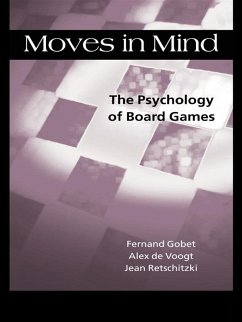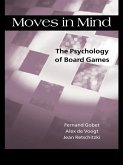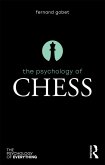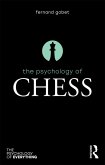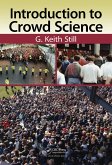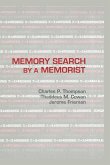Fernand Gobet, Jean Retschitzki, Alex de Voogt
Moves in Mind (eBook, PDF)
The Psychology of Board Games
57,95 €
57,95 €
inkl. MwSt.
Sofort per Download lieferbar

29 °P sammeln
57,95 €
Als Download kaufen

57,95 €
inkl. MwSt.
Sofort per Download lieferbar

29 °P sammeln
Jetzt verschenken
Alle Infos zum eBook verschenken
57,95 €
inkl. MwSt.
Sofort per Download lieferbar
Alle Infos zum eBook verschenken

29 °P sammeln
Fernand Gobet, Jean Retschitzki, Alex de Voogt
Moves in Mind (eBook, PDF)
The Psychology of Board Games
- Format: PDF
- Merkliste
- Auf die Merkliste
- Bewerten Bewerten
- Teilen
- Produkt teilen
- Produkterinnerung
- Produkterinnerung

Bitte loggen Sie sich zunächst in Ihr Kundenkonto ein oder registrieren Sie sich bei
bücher.de, um das eBook-Abo tolino select nutzen zu können.
Hier können Sie sich einloggen
Hier können Sie sich einloggen
Sie sind bereits eingeloggt. Klicken Sie auf 2. tolino select Abo, um fortzufahren.

Bitte loggen Sie sich zunächst in Ihr Kundenkonto ein oder registrieren Sie sich bei bücher.de, um das eBook-Abo tolino select nutzen zu können.
This book, which is the first systematic study of psychology and board games, covers topics such as perception, memory, problem solving and decision making, development, intelligence, emotions, motivation, education, and neuroscience.
- Geräte: PC
- mit Kopierschutz
- eBook Hilfe
- Größe: 3.58MB
Andere Kunden interessierten sich auch für
![Moves in Mind (eBook, ePUB) Moves in Mind (eBook, ePUB)]() Fernand GobetMoves in Mind (eBook, ePUB)57,95 €
Fernand GobetMoves in Mind (eBook, ePUB)57,95 €![The Psychology of Chess (eBook, PDF) The Psychology of Chess (eBook, PDF)]() Fernand GobetThe Psychology of Chess (eBook, PDF)13,95 €
Fernand GobetThe Psychology of Chess (eBook, PDF)13,95 €![The Psychology of Chess Skill (eBook, PDF) The Psychology of Chess Skill (eBook, PDF)]() Dennis H. HoldingThe Psychology of Chess Skill (eBook, PDF)31,95 €
Dennis H. HoldingThe Psychology of Chess Skill (eBook, PDF)31,95 €![The Psychology of Chess (eBook, ePUB) The Psychology of Chess (eBook, ePUB)]() Fernand GobetThe Psychology of Chess (eBook, ePUB)13,95 €
Fernand GobetThe Psychology of Chess (eBook, ePUB)13,95 €![Introduction to Crowd Science (eBook, PDF) Introduction to Crowd Science (eBook, PDF)]() G Keith StillIntroduction to Crowd Science (eBook, PDF)50,95 €
G Keith StillIntroduction to Crowd Science (eBook, PDF)50,95 €![Addition and Subtraction (eBook, PDF) Addition and Subtraction (eBook, PDF)]() Addition and Subtraction (eBook, PDF)33,95 €
Addition and Subtraction (eBook, PDF)33,95 €![Memory Search By A Memorist (eBook, PDF) Memory Search By A Memorist (eBook, PDF)]() Charles P. ThompsonMemory Search By A Memorist (eBook, PDF)37,95 €
Charles P. ThompsonMemory Search By A Memorist (eBook, PDF)37,95 €-
-
-
This book, which is the first systematic study of psychology and board games, covers topics such as perception, memory, problem solving and decision making, development, intelligence, emotions, motivation, education, and neuroscience.
Dieser Download kann aus rechtlichen Gründen nur mit Rechnungsadresse in A, B, BG, CY, CZ, D, DK, EW, E, FIN, F, GR, HR, H, IRL, I, LT, L, LR, M, NL, PL, P, R, S, SLO, SK ausgeliefert werden.
Produktdetails
- Produktdetails
- Verlag: Taylor & Francis eBooks
- Seitenzahl: 288
- Erscheinungstermin: 5. August 2004
- Englisch
- ISBN-13: 9781135425135
- Artikelnr.: 43071672
- Verlag: Taylor & Francis eBooks
- Seitenzahl: 288
- Erscheinungstermin: 5. August 2004
- Englisch
- ISBN-13: 9781135425135
- Artikelnr.: 43071672
- Herstellerkennzeichnung Die Herstellerinformationen sind derzeit nicht verfügbar.
Ferdnand Gobet is Professor of Psychology at Brunel University, West London. He is an International Master of the International Chess Federation and has played for several years with the Swiss national team.
Alex de Voogt is at the University of Leiden and Managing Editor of the journal Board Game Studies.
Jean Retschitzki is Professor of Psychology at the University of Fribourg. He was elected as President of the Swiss Society of Psychology in 1998
Alex de Voogt is at the University of Leiden and Managing Editor of the journal Board Game Studies.
Jean Retschitzki is Professor of Psychology at the University of Fribourg. He was elected as President of the Swiss Society of Psychology in 1998
Part 1: Introduction.Moves in Mind. Board Games and Cognitive Psychology.
The Role of Board Games in Science. The Role of Board Games in Psychology.
Structure of the Book. Part 2: Formal Analyses of Board Games. Fundamental
Concepts. Board Games in Computer Science and Artificial Intelligence.
Information and Complexity Analysis. Game Theory and the Concept of Error.
Conclusion. Part 3: Theories of Board-game Psychology. A Brief History of
Board-game Psychology. Theories of Chess Skill. Influences from Other
Theories of Cognition. Theories of Development and Environment. Conclusion.
Part 4: Perception and Categorization. Low-level Perception. High-level
Perception and Categorization. Conclusion. Part 5: Memory, Knowledge, and
Representations. Memory for Board Positions. Recall of Sequences of Moves
and of Games. Estimation of the Number of Chunks in LTM. Mode of
Representation. Representations Used in Blindfold Playing. Knowledge and
Memory Schemata. Discussion. Conclusion. Part 6: Problem Solving and
Decision Making. Empirical Data on Search Behaviour. Empirical Data on the
Role of Perception in Problem Solving. Empirical Data on the Role of
Knowledge in Problem Solving. Analogy Formation in Novice Players.
Theoretical Accounts. Discussion. Conclusion. Part 7: Learning, Development
and Ageing. Early Stages of Learning. Development of Play and Game
Behaviour. Developmental Studies of Specific Board Games. Ageing.
Conclusion. Part 8: Education and Training. Introduction. Board Game
Instruction and the Transfer of Skill. Teaching the Rules and Basic
Instruction. Training and Coaching at an Advanced Level. Conclusion. Part
9: Individual Differences and the Neuropsychology of Talent.Intelligence
and Visuo-spatial Abilities. Personality. Emotions and Motivation. Board
Games and Neuroscience. Overall Conclusion. Part 10: Methodology and
Research Designs. Definitions of Expertise. Game Specificity. Illiterate
Games. Ecological Validity. Cross-cultural Aspects. The Creation and Use of
Archives and Databases. Observations and Natural Experiments. Interviews
and Questionnaires. Introspection and Retrospection. Protocol Analysis.
Standard Experimental Manipulations. Neuroscientific Approaches. Typical
Research Designs. Mathematical and Computational Modelling. Weaknesses and
Strengths of Methodologies Used in Board-game Research. Part 11:
Conclusion. Board Game Complexity. Landscape of Board Games. Impact of
Board-game Research. Future. References. Appendix 1: Rules of Board Games.
Appendix 2: Measures of Expertise in Board Games. Appendix 3: Example of
Protocol Analysis.
The Role of Board Games in Science. The Role of Board Games in Psychology.
Structure of the Book. Part 2: Formal Analyses of Board Games. Fundamental
Concepts. Board Games in Computer Science and Artificial Intelligence.
Information and Complexity Analysis. Game Theory and the Concept of Error.
Conclusion. Part 3: Theories of Board-game Psychology. A Brief History of
Board-game Psychology. Theories of Chess Skill. Influences from Other
Theories of Cognition. Theories of Development and Environment. Conclusion.
Part 4: Perception and Categorization. Low-level Perception. High-level
Perception and Categorization. Conclusion. Part 5: Memory, Knowledge, and
Representations. Memory for Board Positions. Recall of Sequences of Moves
and of Games. Estimation of the Number of Chunks in LTM. Mode of
Representation. Representations Used in Blindfold Playing. Knowledge and
Memory Schemata. Discussion. Conclusion. Part 6: Problem Solving and
Decision Making. Empirical Data on Search Behaviour. Empirical Data on the
Role of Perception in Problem Solving. Empirical Data on the Role of
Knowledge in Problem Solving. Analogy Formation in Novice Players.
Theoretical Accounts. Discussion. Conclusion. Part 7: Learning, Development
and Ageing. Early Stages of Learning. Development of Play and Game
Behaviour. Developmental Studies of Specific Board Games. Ageing.
Conclusion. Part 8: Education and Training. Introduction. Board Game
Instruction and the Transfer of Skill. Teaching the Rules and Basic
Instruction. Training and Coaching at an Advanced Level. Conclusion. Part
9: Individual Differences and the Neuropsychology of Talent.Intelligence
and Visuo-spatial Abilities. Personality. Emotions and Motivation. Board
Games and Neuroscience. Overall Conclusion. Part 10: Methodology and
Research Designs. Definitions of Expertise. Game Specificity. Illiterate
Games. Ecological Validity. Cross-cultural Aspects. The Creation and Use of
Archives and Databases. Observations and Natural Experiments. Interviews
and Questionnaires. Introspection and Retrospection. Protocol Analysis.
Standard Experimental Manipulations. Neuroscientific Approaches. Typical
Research Designs. Mathematical and Computational Modelling. Weaknesses and
Strengths of Methodologies Used in Board-game Research. Part 11:
Conclusion. Board Game Complexity. Landscape of Board Games. Impact of
Board-game Research. Future. References. Appendix 1: Rules of Board Games.
Appendix 2: Measures of Expertise in Board Games. Appendix 3: Example of
Protocol Analysis.
Part 1: Introduction.Moves in Mind. Board Games and Cognitive Psychology.
The Role of Board Games in Science. The Role of Board Games in Psychology.
Structure of the Book. Part 2: Formal Analyses of Board Games. Fundamental
Concepts. Board Games in Computer Science and Artificial Intelligence.
Information and Complexity Analysis. Game Theory and the Concept of Error.
Conclusion. Part 3: Theories of Board-game Psychology. A Brief History of
Board-game Psychology. Theories of Chess Skill. Influences from Other
Theories of Cognition. Theories of Development and Environment. Conclusion.
Part 4: Perception and Categorization. Low-level Perception. High-level
Perception and Categorization. Conclusion. Part 5: Memory, Knowledge, and
Representations. Memory for Board Positions. Recall of Sequences of Moves
and of Games. Estimation of the Number of Chunks in LTM. Mode of
Representation. Representations Used in Blindfold Playing. Knowledge and
Memory Schemata. Discussion. Conclusion. Part 6: Problem Solving and
Decision Making. Empirical Data on Search Behaviour. Empirical Data on the
Role of Perception in Problem Solving. Empirical Data on the Role of
Knowledge in Problem Solving. Analogy Formation in Novice Players.
Theoretical Accounts. Discussion. Conclusion. Part 7: Learning, Development
and Ageing. Early Stages of Learning. Development of Play and Game
Behaviour. Developmental Studies of Specific Board Games. Ageing.
Conclusion. Part 8: Education and Training. Introduction. Board Game
Instruction and the Transfer of Skill. Teaching the Rules and Basic
Instruction. Training and Coaching at an Advanced Level. Conclusion. Part
9: Individual Differences and the Neuropsychology of Talent.Intelligence
and Visuo-spatial Abilities. Personality. Emotions and Motivation. Board
Games and Neuroscience. Overall Conclusion. Part 10: Methodology and
Research Designs. Definitions of Expertise. Game Specificity. Illiterate
Games. Ecological Validity. Cross-cultural Aspects. The Creation and Use of
Archives and Databases. Observations and Natural Experiments. Interviews
and Questionnaires. Introspection and Retrospection. Protocol Analysis.
Standard Experimental Manipulations. Neuroscientific Approaches. Typical
Research Designs. Mathematical and Computational Modelling. Weaknesses and
Strengths of Methodologies Used in Board-game Research. Part 11:
Conclusion. Board Game Complexity. Landscape of Board Games. Impact of
Board-game Research. Future. References. Appendix 1: Rules of Board Games.
Appendix 2: Measures of Expertise in Board Games. Appendix 3: Example of
Protocol Analysis.
The Role of Board Games in Science. The Role of Board Games in Psychology.
Structure of the Book. Part 2: Formal Analyses of Board Games. Fundamental
Concepts. Board Games in Computer Science and Artificial Intelligence.
Information and Complexity Analysis. Game Theory and the Concept of Error.
Conclusion. Part 3: Theories of Board-game Psychology. A Brief History of
Board-game Psychology. Theories of Chess Skill. Influences from Other
Theories of Cognition. Theories of Development and Environment. Conclusion.
Part 4: Perception and Categorization. Low-level Perception. High-level
Perception and Categorization. Conclusion. Part 5: Memory, Knowledge, and
Representations. Memory for Board Positions. Recall of Sequences of Moves
and of Games. Estimation of the Number of Chunks in LTM. Mode of
Representation. Representations Used in Blindfold Playing. Knowledge and
Memory Schemata. Discussion. Conclusion. Part 6: Problem Solving and
Decision Making. Empirical Data on Search Behaviour. Empirical Data on the
Role of Perception in Problem Solving. Empirical Data on the Role of
Knowledge in Problem Solving. Analogy Formation in Novice Players.
Theoretical Accounts. Discussion. Conclusion. Part 7: Learning, Development
and Ageing. Early Stages of Learning. Development of Play and Game
Behaviour. Developmental Studies of Specific Board Games. Ageing.
Conclusion. Part 8: Education and Training. Introduction. Board Game
Instruction and the Transfer of Skill. Teaching the Rules and Basic
Instruction. Training and Coaching at an Advanced Level. Conclusion. Part
9: Individual Differences and the Neuropsychology of Talent.Intelligence
and Visuo-spatial Abilities. Personality. Emotions and Motivation. Board
Games and Neuroscience. Overall Conclusion. Part 10: Methodology and
Research Designs. Definitions of Expertise. Game Specificity. Illiterate
Games. Ecological Validity. Cross-cultural Aspects. The Creation and Use of
Archives and Databases. Observations and Natural Experiments. Interviews
and Questionnaires. Introspection and Retrospection. Protocol Analysis.
Standard Experimental Manipulations. Neuroscientific Approaches. Typical
Research Designs. Mathematical and Computational Modelling. Weaknesses and
Strengths of Methodologies Used in Board-game Research. Part 11:
Conclusion. Board Game Complexity. Landscape of Board Games. Impact of
Board-game Research. Future. References. Appendix 1: Rules of Board Games.
Appendix 2: Measures of Expertise in Board Games. Appendix 3: Example of
Protocol Analysis.
